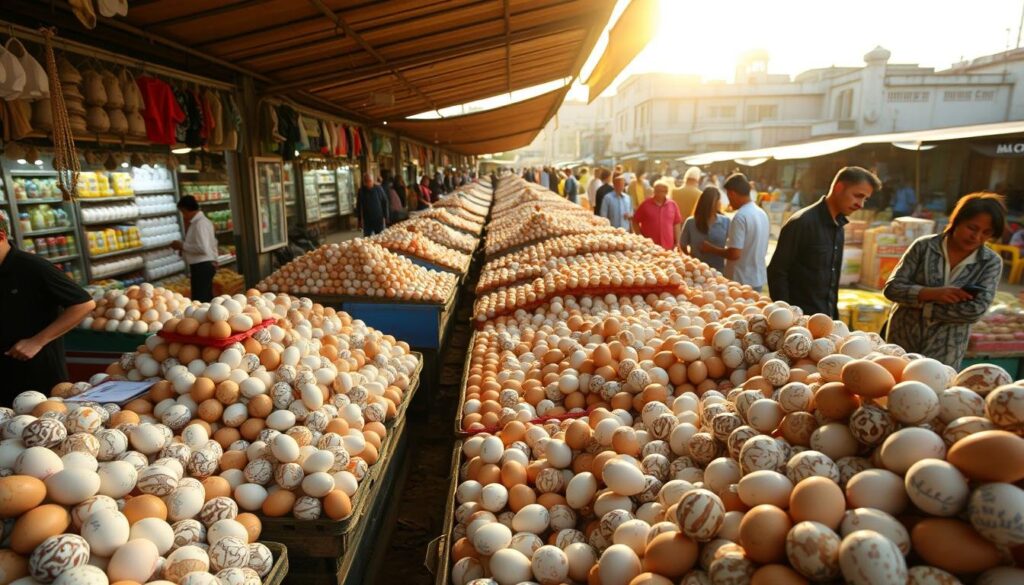You might have noticed that eggs often cost more than chicken. This is despite both coming from the same animals. It might seem puzzling at first glance.
The egg production process and chicken meat production have different costs and market dynamics. Knowing these can help you shop smarter.
The price difference between eggs and chicken is due to several factors. These include the costs of egg production and the demand for chicken meat.
The Price Paradox: Eggs vs. Chicken Meat
It might surprise you to know that eggs and chicken meat prices are influenced by many factors. Your choices as a consumer affect the market. Demand for eggs and chicken can change due to seasons, cultural tastes, and the economy.
The costs to make eggs and chicken meat are different. Let’s look at what makes egg production more expensive.
| Cost Component | Egg Production | Chicken Meat Production |
|---|---|---|
| Feed Costs | 60% | 70% |
| Labor Costs | 15% | 10% |
| Other Costs | 25% | 20% |
The table shows that feed costs are a big part of both egg and chicken meat costs. But, labor and other costs are different. Knowing this helps us understand why eggs and chicken meat cost differently.
Being aware of these factors helps you make better choices. You can think about market and consumer behavior when you buy.
Why Is Eggs So Expensive But Not Chicken?
You might wonder why eggs cost more than chicken, even though they come from the same source. The reason is complex and tied to the egg production process.
Feed Costs and Egg Production
The cost of feed for chickens is a big factor. The quality and price of feed greatly affect egg production costs. Feed costs can account for up to 70% of the total egg production cost. This makes feed a key factor in egg prices.
Feed prices change due to the cost of raw materials like corn and soybeans. When these prices go up, so does the cost of feed and eggs. Also, laying hens need high-quality feed, which adds to the expense.
The egg production process itself is costly. Keeping laying hens requires a lot of resources. This includes energy for lighting and heating, and labor for daily tasks. These costs are reflected in the final egg price, making eggs pricier than chicken.
Knowing these factors helps explain why eggs are more expensive than chicken. The next section will explore the egg production process and its costs in more detail.
The Egg Production Process and Its Costs
Learning about egg production shows why eggs cost more than chicken. The process includes many steps, from breeding hens to packaging eggs. Each step is important for the final product.
The first part is breeding and raising laying hens. This needs a lot of high-quality feed and veterinary care. It also costs a lot for labor, as experts are needed to care for the hens.
After hens start laying eggs, they are collected, cleaned, and sorted. This is often done by machines that need regular checks. Then, the eggs are packaged and ready for delivery, adding to the egg production cost.
Supply chain factors also affect egg prices. Costs like transportation, storage, and handling add up. Plus, following rules and checking quality are important but also increase costs.
In short, making eggs is a complex and expensive process. From breeding hens to packaging eggs, each step has its costs. Knowing these details helps us understand the value of the eggs we buy.
Chicken Meat Production Economics
Exploring the economics of chicken meat production can explain why eggs might cost more than chicken. The chicken meat industry is complex, shaped by many economic factors. These include feed costs, breeding practices, and how the meat is processed.
Chicken meat production is a big business that uses economies of scale. Yet, it faces ups and downs in feed costs, disease outbreaks, and market demand. Feed costs are a big part of the production expenses.
| Cost Component | Description | Percentage of Total Cost |
|---|---|---|
| Feed Costs | Cost of feed for chickens | 60% |
| Breeding | Cost of breeding and hatching chickens | 15% |
| Processing | Cost of processing chicken meat | 25% |
The cost of chicken meat production is shaped by the supply chain. This includes the cost of feed, breeding, and processing. Market dynamics also matter, with demand and supply changes affecting prices.
Knowing these economics helps you make better choices when buying meat. The chicken meat industry’s size and sensitivity to external factors like disease and market changes affect prices for consumers.
Supply Chain and Regulatory Factors
Did you know how supply chain and rules affect egg prices? Eggs go through many hands, from farmers to stores. Each step adds to the cost.
Regulatory factors like animal care and environmental rules also play a big role. For example, rules for cage-free or free-range eggs raise costs. These costs are then shared with buyers, making eggs pricier.
| Factor | Egg Production | Chicken Meat Production |
|---|---|---|
| Regulatory Compliance | Higher due to animal welfare standards | Lower compared to egg production |
| Supply Chain Complexity | More complex due to multiple stakeholders | Less complex with more direct distribution |
| Production Cost | Increased by regulatory requirements | Relatively lower due to fewer regulations |
The table shows how supply chain and rules impact egg costs. Knowing this helps us understand why eggs cost more than chicken.
Market Dynamics and Consumer Behavior
You, as a consumer, have the power to influence market trends through your purchasing decisions. This affects the prices of eggs and chicken. Demand for these products can change due to many factors. These include cultural preferences, economic conditions, and seasonality.
For example, during holidays or special events, the demand for eggs may go up. This is because of traditional cooking practices, leading to higher prices. Also, consumer preferences for organic or free-range eggs can make them more expensive than conventional eggs.

Economic conditions also have a big impact. In good economic times, people might pay more for eggs seen as higher quality. This includes eggs from hens raised on pasture. But in tough economic times, people might look for cheaper options.
Seasonality also affects egg and chicken prices. For instance, egg production might drop in winter due to less daylight. This can make prices go up. Knowing these trends can help you shop smarter.
By understanding these factors, you can save money on your grocery bills. Whether it’s picking different types of eggs or adjusting your buying based on the season, your choices can influence the market.
Conclusion: Reason Eggs Cost More Than Chicken
You now know why eggs are often pricier than chicken meat. Several factors play a role, like the cost of making eggs and chicken. The egg-making process, supply chains, and market trends all affect egg prices.
When you shop for groceries, think about the poultry industry’s details. Next time you’re at the store, you’ll see why eggs and chicken cost what they do. Knowing this helps you choose what fits your budget and taste.
See Also: Why Renting is Cheaper Than Buying a Home?
FAQ
Why do eggs often cost more than chicken?
Eggs cost more because of the complex process of making them. This includes the cost of keeping laying hens and the quality control. Also, the feed for these hens adds to the expense.
What factors contribute to the cost of egg production?
Several things affect egg production costs. These include the cost of feed, labor, and equipment. Veterinary care and keeping the hens also play a role.
How does chicken meat production affect the price of chicken?
The price of chicken is influenced by several factors. These include the cost of feed, breeding, and processing. Fluctuations in feed costs, disease outbreaks, and demand also impact the price.
What can I do as a consumer to make informed decisions about my grocery shopping?
Knowing what affects egg and chicken prices helps you shop smarter. Consider your preferences and budget when choosing what to buy.
How do feed costs impact the price of eggs and chicken?
Feed costs are a big deal for both egg and chicken production. Changes in feed prices can make eggs and chicken more expensive.
What is the significance of economies of scale in chicken meat production?
Big chicken farms can save money by producing more. This reduces the cost per unit, affecting the chicken price.

Hi, I’m Fernando Pham, and welcome to WhyDetails.com! I’m from San Francisco, and I love exploring questions and sharing answers through my blog.



